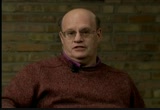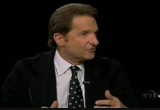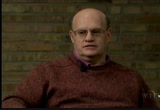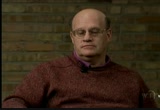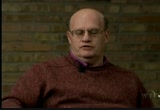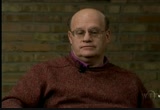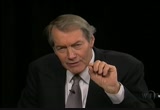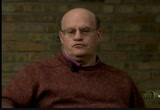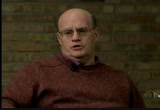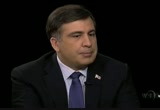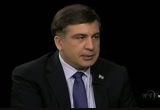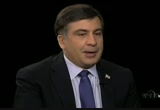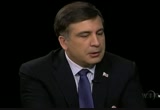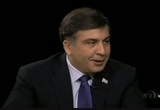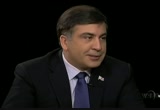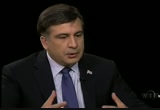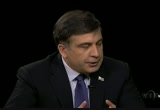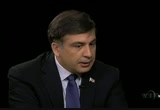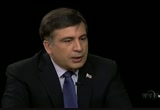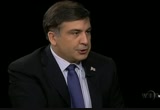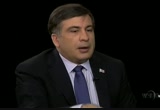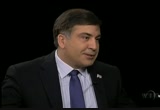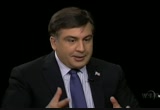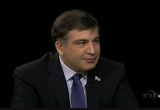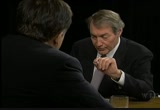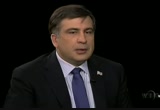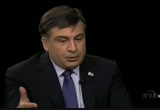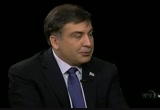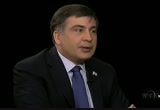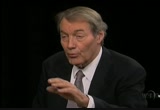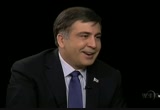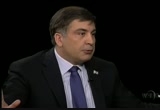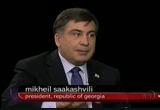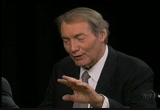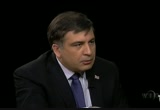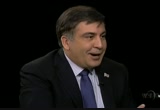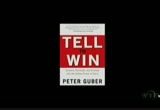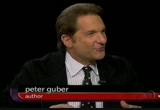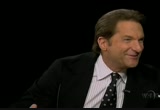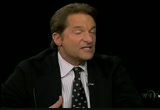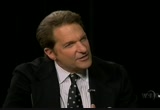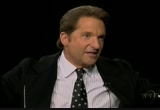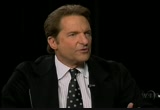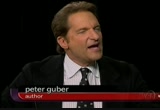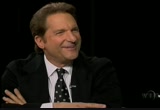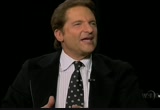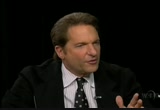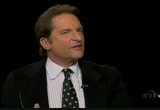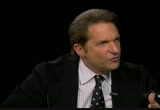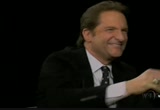tv Charlie Rose WHUT March 14, 2011 6:00am-7:00am EDT
6:00 am
>> welcome to our program, we begin this evening with the earthquake in japan. and an analysis by professor seth stein of northwestern university. >> this was much bigger than we expected to see on that part of the what's call the the japan trench. and one of the things we've been learning everything since 2004 was we used, before 2004 we thought we knew which piece of sub duction zones could have these really big earthquakes. the sumatra earthquake and now this one, what the earth often does, we learn to be pretty humble in the face of the complexities of the earth. the earth has the ability to surprise us. i think none of us expected
6:01 am
that anything this big would happen there. >> rose: we continue with the president of georgia, talking about his relationship with russia and the events of 2008. >> america's main value for peoples like us, and there are many of us out there, right s that america, besides having power or economic leverage, it's also an idea t is a much bigger than than just another country. that is what makes america so strong. there is more freedomses it there in the world, it's much more pragmatic. and that's, i think there is nothing that can stop freedom. it's inevitable this is going to happen. and america should lead it. and i think should not be scared of it. >> rose: we conclude with film producer peter guber talking about the art much storytelling. >> i had it backyards. i spent 35 or 36 years about storytelling. and i realized that the secret sauce was telling purposeful stories, using that as emotional transportation. and that looking at the people you want to act together or work with you or be a customer or clients or
6:02 am
join your church or whatever, that they aim with the heart and what you have to aim at the heart is the story, not the facts and information. important, but you have to aim at the heart. >> a program note congresswoman barbara lee was scheduled to on this program, she was here for a wonderful interview that will be seen next week. tonight we look at the tsunami in japan. we talk to the president of georgia and we hear some ideas about storytelling and narrative when we continue. >> funding for charlie rose was provided by the following: every story needs a hero we can all root for. who beats the odds and comes out on top. but this isn't just a hollywood storyline. it's happening every day, all across america. every time a storefront opens. or the midnight oil is burned.
6:03 am
or when someone chases a dream, not just a dollar. they are small business owners. so if you wanna root for a real hero, support small business. shop small. additional funding provided by these funders: captioning sponsored by rose communications from our studios in new york city, this is charlie rose. . >> rose: we begin with the tsunami in japan, an 8.9 pag tude earthquake sfruk off the coast of that country today it was the strongest ever recorded in japan and the fifth largest in the world since 1900. the quake create add a
6:04 am
tsunami which swept over citieses and testify stated the northeast. at the time of this taping some 350 people were reported dead and even more missing. there are also fearses about the radiation levels inside a japanese power plant. warnings have been issued in places as far as the west coarse of the united states and south america. here is what president obama said today at a news conference. >> today's events remind us of just how fragile life can be. our heart goes out to our friends in japan and across the region and we're going to stand with them as they recover and rebuild from this tragedy. >> rose: joining me from chicago seth stein, a seismologist and professor at the department of effort and planetary sciens-- sciences at northwestern yeening. and i am pleased to have him here on what has to be a very busy day for him. thank you for being this. >> it is my pleasure. >> rose: tell me where this this kind of earth-- earthquake come from and what makes it so destructive. >> what we have is the huge
6:05 am
pacific plate, the big rock thing under most of the pacific ocean. going underneath japan. it's subducting as we say. and every year it would like to go down there by about three inches but it's stuck. so over a couple hundred years, all that energy just gets stored up and then one day it just sort of backs and pushes its way further down by many feet. so the earthquake pushes downward. so as it pushes down, it lifts up the sea floor. that pushes up the water above it. then that water then spreads out just like rippleses on a bathtub. imagine puttinging your hand in the bottom of the bathtub and liftinging it up a couple of inchesment you lift up the water and the water spreads out in a giant ripple that ripple is what we call a tsunami, a seismic sea wave that travels across the ocean about the speed of a jet plane. when it comes to the shore, it builds up, gets a lot bigger, and comes ashore. and can do terrible damage.
6:06 am
>> rose: what do we mean by subduction zone. >> the way the earth works is that the earth has an outer shell that's about 50 miles deep. and those thingses are called plates. they move around about as fast as your fingernails grow. so for example, the san andreas fault is the boundary between the pas civic and north american plates. where the pas civic plate moves north relative to south-- to north american plate. in japan, the pas civic plate is trying to go underneath japan. it's going back into the earth, being stuffed in. that's the reason we have earthquakes in oregon and washington, the same sort of earthquakes in alaska. it also makes the volcanoes in these countries. >> rose: what kind of warning does the earth give? >> the earth doesn't give us any warning. that's what is so hard about all of this. we don't know exactly when they break. we know over time the motion gets stored up. but it's kind of like trying to bend a stick. you know event allly it's
6:07 am
going to break but it's hard to tell exactly when it's goinging to break. so we know to within a couple hundred years which isn't all that useful that we're goinging to have big earthquakes in that part of the world. so the japanese have been preparing for it. but they don't know when. >> rose: and what is an aftershock mean and what is the impact here? >> well, a fault is a big surface, a big area, hundreds of mileses long and maybe 50 miles deep into the earth, big, big patch. it doesn't all slip exactly the same amount. some parts slip a little more in the earthquake, some slip a little less is so after the earthquake, there are lots of sort of jostling around on that fault plain. those are smaller earthquakes which can still be pretty big. and those can go on, in this case, for tens of years after the big earthquake. they will drop, they become less and less common with time, but they will go on for a while.
6:08 am
>> rose: what are the advances in your field? what are you learning that you didn't know? >> well, probably the single biggest thing we've learned to do is we used to to the be able to measure how fast these plates moved. because they move about as fast as your fingernails grow. we can only measure their motions over millions of years. now what we've learned to do is with gps, with accurate gps we can measure egg motions of less than a tenth of an inch per year. so we're now able to monitor the motions of these plates and we can watch them storing up the energy that's going to come out in these big earthquakes. we still can't tell exactly what thenary going to happen. another big advance we've made in the last 50 years or so is the development of tsunami warning systems. and that's how they were able to issue warnings to places like hawaii, or the pas civic northwest. and say when this wave would. >> when you look at what happened here, was the japanese government because
6:09 am
of understanding their vulnerability, more prepared than most governments might have been? >> i think the japanese were well prepared. i would say that we are well prepared in the areas where vulnerable to tsunamis. the tsunami warning system seems to have worked well. there are similar plans are made in the u.s. to arrange for evacuation routes in the event of earthquakes, of tsunamies and earthquakes. so i think our degree of preparedness and the japanese degree of preparedness are quite similar. we learned a lot from each other. after a big earthquake like this there will be effortses to look at what worked and what didn't work and fix the things that didn't work. >> rose: what surprises you about what you have seen so far? >> this was much bigger than we expected to see on that part of the what's called the japan trench, subduction zone. and one of the things we've been learning ever since 2004 was, before 2004 we
6:10 am
thought we knew which piece of subduction zones could have these really big earthquakes. the sue nationalia earthquake and now this on one-- the sumatra earthquake and now this one what the earth often does is we learn to be pretty humble in the face of the complexities of the earth. the earth has the ability to surprise us. i think none of us expected that anything this big would happen there. we're now realizing that the really big earthquakes are showing up on pieces of su subduction zone that we frankly didn't expect to see them. >> are they becoming more regular? are they happening more now than you might have expected? >> no, i don't think so. we, this is probably just coincidence. there have been about five in the size in the last 100 years or so. we think it's just coincidence. we had two really, really big ones in 1960 and 1964. and then we had 2004 and now this one. i think what it is it is probably just the statistics of very rare events. there is a thing that every
6:11 am
time you go up one magnitude unit you get ten times rarer. so in other words, magnitude nines are ten times rarer than magnitude eights and those are ten times rarer than magnitude seven. it's kind of like you know there are a lot fewer really rich people than middle class people. and so predicting when the really rare things are going to happen is even harder. >> so suppose someone who had been away today and had no communication at all with the news that's taken place in the last two days, what would you tell them happened in japan? >> i would say that there was a big earthquake. it moved the sea floor. the sea floor generated a big wave in the ocean. that wave came ashore and has done a great deal of dang alonged coast of japan it will clearly be days before they can do initial cleanup. and there will be-- it will abe long-term reconstruction needed. >> rose: how will you study this event? >> i personally will be
6:12 am
mostly looking at seismograms, my colleague right now who is in tahiti is part of a group that actually travels to the sites of all major tsunamies and studies the damage, records them. and sort of makes the detailed mathematical model of what actually happened in the tsunami. then that group and other people provide information that is used to improve tsunami warning systems and tsunami predictions. you notice that they did a pretty good job of predicting-- where, not only when the tsunami would arrive but about how billing it is. then we'll be involved in other partses of that process. one of our biggest-- one of the biggest things we've been involved in is trying to determine how fast the plates move and from that to say about how often things like this happen. so we've already done studies to determine how fast on average the pas civic plates subducts under japan that work was with colleagues from the university of tokyo.
6:13 am
>> rose: professor stein, thank you so much. it's been very, very informative. >> okay. well, it has been my pleasure. >> rose: we'll be right back. stay with us. mr. saakashvili is here, the president of the republic of georgia. in august 2008 georgia and russia fought a brief war over the breakaway region. today rushach and gorge da-- gorge gra-- georgia are in mediated talks over their wantinging to -- >> the issue was eye on joe biden's a-- agenda durings his trip to moscow. i'm pleased to have the president of georgia welcome. >> thank you for inviting me. always nice be back in your studio. >> rose: you once said you wanted for georgia to be a bit of switzerland and a bit of singapore. >> i still insist on that and it has become much more like switzerland and much more of singapore, actually. you know, georgia's transformation from what was a totally failed state with
6:14 am
megacorruption, one of the worst places in the world to do business, into what we are now, which accdinging to-- there are certain benchmarks. so the world bank says we are the world's number one reformer, economic reform based on five year's period. that is around the time i have been president. transparency internationally is the main. corruption waurb dog in the world. they've made polling and basically they said that no other country in the world's progress encore ruption, fighting corruption is matched. so we are number one fighting with corruption. and i think it was a mental revolution it was very well set by the-- mental revolution. it is everything. it is the fact that you know when i came the first time, by that moment, 98% of georgia in gallop poll said that they encountered corruption. last month's poll actually said that, put this figure at 0.4. and it is also, you know, the way how people behave. the way how they interact
6:15 am
with institutions. the way, the whole body language, you know, ago texture, everything. >> rose: architecture means the fa fact that all the police stations have glass fronts and new department of the interior is a major sort of -- >> the department of interior minister of interior, that building was voted by i think a major architectural newspaper of the world, best building in the world in 2080. but also every-- police station and now all the custom service and other like government agencies, they are put in glass. and you see this, you know, well dressed people. i mean when you talk about police, uniformed people, sitting at their computers, in busy neighborhoodses. and people can interact going to that. this is a service. they are not there to closed eye on the neighborhood or on the people they are not there for political control. they are there to serve people. and that's 9 mentality that, people started to interact with the institutions. on the one hand they see, but there is much more respect for such service.
6:16 am
you know, people used to fear institutions. people used to des piece institutions. now they see them as their service to them and they like them. and they actually was the best thing in terms of mental revolution is that initially, we, every political figure in georgia ran faster than any institution. now every institution, even government at this stage is quite popular but i have seen ups and downs. but every institution is more popular. like parliament is more popular, like president is more popular. >> rose: so institutions have popularity in georgia. >> yeah. >> rose: what's the relationship with the u.s. government. >> well, first of all, you mentioned we signed this deal with donald trump and now-- . >> rose: a company from the region is going to build -- >> a multi, multicompany effort. and matching fundses from the u.s., an active part of it, the major part will be coming from overseas. and of course, trump will be
6:17 am
involved in promotion and marketing. >> rose: . >> he is investing all his effortses if that. >> rose: that is his business. >> but actually, but i think it's a part of, you mentioned i came here last time, when we just were fresh from that invasion, war. but now it's also symbol. more than just another building by somebody. it's in a place which has amazing number of new development, new private investment. and basically it's a benchmark as well, like all these things we had in the paper. like benchmark of visual, benchmark of people building. with regardses to the u.s. government, coming back to your question. we have very good working relation with the obama administration. hi two recent meetings with president obama in washington. and they have been consistently supporting our territorial integrity. they've been supporting the identify of the occupation. they were one of the first governmentses in the world to call what the russian
6:18 am
president, illegal military occupation. and they certainly are calling on russia to end it. and they have been giving us especially immediately after the war, financial support. that was at that moment -- >> here is the other side of that. the president also wants to reset the relationship with russia. and in doinging that, there is some feeling that some of the things that might have-- you might have expected from the bush administration are not coming from the obama administration. having to do with a full out support for nato membership? which maybe on a kind of back burner. and that that is all because they don't want to antagonize russia as they try to reset the relationship. >> well official position on nato. >> is that what you believe? >> official position of u.s. administration as well as their efforts in the organization have remained the same that georgia -- >> what do you think georgia will get. >> nato membership. >> the problem with nato
6:19 am
membership is consensus within the organization. georgia is like the best pupil in the class. we are always getting x on grades on reform-- ex excellent grades including military reform and democratization and other things that are essential for full-fledged membership but then we never happen to pass to the next grade. and that is not because of the suchlt-- that is because of absence of consensus in europe and there is no secret that it is also based on goo political in the region. >> you know i can read you quotes out of your mouth which said, you had some reservations about the obama administration after the relationship you had with president bush. >> i wouldn't say so. because the initial, you know, the idea of reset, the issues that were, obviousl obviously-- some kind of-- the idea that democracy do matter for america or america support for the
6:20 am
freedom people as firing for freedom l it stay in place. but we've seen on this particular issue that president obama, vice president biden who came also, secretary hillary, who is a very good friend also came several timeses to see us. and they have been very consistent. and they have been very clear that you know, they don't, and they will not accept, it is illegal and they're not going to do at the expense of the others. that was the initial fear. frank lien when you see what happened. >> let me hear you out. are you very, very happy with the u.s. relationship with russia and the direction it's taking. because vice president biden just went to see president medvedev and he said that russia's membership in wto was the highest priority for the united states. where you on the membership of russia in to the world trade organization. >> well, let's face it. everybody, you know, the
6:21 am
idea of russia membership is to the bad for anybody. especially russia's neighborhood. >> so it's in your interest for russia to be a member of the world trade organization. >> it's in our interest for russia to get into a regular kind of rule of law or international rule, kind of regime also in our region. now having said that, the u.s. has come to this position after many years of negotiations. after many years of sorting out bilateral trade issues. and the same is true for europe and other neighbors of russia. now there are issues still left out there with georgia. the russian government not only-- our government or our borders but they actually for long time refused even though have the idea that the country of georgia exists and they should talk and short out issues exactly the same the way as they would do with like great nation of the united states but as well small neighbors. they have-- so actually we finally came to the point when they had to come to bilateral negotiations with us.
6:22 am
and there was-- i have to tell you, there have been attempts on the russian side to go to the u.s. and say it is your problem. they are your clients. so it's part of the package. we sort out thingses with you and then you go and tell them. and i have to say to the credit -- >> the russianses have come to the united states and said we'll sort out things with you and you tell the georgianses what the deal is and you make it work. >> absolutely. >> to the credit of this administration, they are told very clearly, come on, these are your issues. your problems. they tolted the same to us. these are bilateral issues. and you should be talking to each other. we are not going to sort it out for you. it's a fair position because it's basically based on the procedures of that organization. >> are you prepared to veto the administration of russia into the wto. >> i wouldn't go to the point of you know, i would not like to get to that point. >> you are prepared to but you don't want to get there. >> we certainly don't want
6:23 am
to get there but it is up to the russians now. it really takes some diplomacy and some compromises to get somewhere. >> but i'm going over ground that you have already been over. you're saying that a condition of our voting, not vetoing russia administration to the world trade organization is for russian troops to withdraw. >> no, the issue with-- general policy of georgia certainly withdrawal that is clear-cut and like we would never -- >> where is that in the priority, the national priorities. >> that is absolute political priority with the russians. but having said that, wto was very specific technical issues connected with control of customses borderses, with recognition, and customs regimes and economic relations. this is very technical issue. you know, we are willing to consider if as a technical issue provided there is very sensible approach and you know, minimum respect from part of russia that no
6:24 am
matter how small georgia is, it also is a tull fledged country and it has 9 government and they have to deal with legitimate, economic and customs and border interest. and we will, and we are ready to you know, find solutions. >> do you have any appreciation of their in a sense feeling that nato membership that goes to georgia and the ukraine is just too close to their borders to make them comfortable. >> i think the biggest problem with this kind of, their reactions is much wider than that. i think what is much more alarming is not, you know, just, you know, forma restoration of nato's flag next to their border. they are all used to it. they have it in other places. they are fine with it. the problem there is that you know, this small georgia, the fat what was decapitated, what they called political corps, in the invasion. they gave me just a few weekses to survive, maybe.
6:25 am
you know, and but they also thought that georgia would never recover. and now they see that people from all around, from circumstance stan,-- kyrgistan, ukraine, moldova, heads of government, presidents in our region, armenia azerbaijan, these people are talking about learning from georgia. lots of russians, including some government officials saying look at this country. if they can make it. >> rose: so your point is. >> i think this is in some way almost ideaological. that the way how we managed to tackle corruption, the way how we managed to free up business and to live with free speech kind of country where you know, in this -- >> there were in your judgement that what you do will infect. >> they think it's contagious because until now they believe that there were only two kinds of regime. yeltsin kind of chaos when, you know, everybody went to mass and it was kind of
6:26 am
democracy but totally chaotic or-- and now we that building democracy, democracy at gunpoint, succeeding, this year, even doubled the growth at least first we had, 9.6 or 7. and that the years strength. is getting dntion with you for 2011 the trend is 9.. >> 9.77. >> for the month of january. >> for the whole year. >> projected growth for the year. >> 9 points. >> and so therefore that makes you, that is a singapore part of your dream. >> actually, they are seeing regionals already. not only that but they see that we have country that has been giving laping tops to kids at school. invited 10,000 english teachers, americans to teach english. we are building new american space, universities, inviting american university people, amazing new roads, new cities. the country is coming back. not just what is on the paper but the reality. the reality is, and this
6:27 am
country still has freedom of speech. we are not flawless. we have lots of problems. we have lots of-- lots of-- but sometimes it's almost funny. it reminded me how we used to treat when i was a child, a kid, cold war, america, it was perfect for us it was an absolute ideal. no criticism was accepted. you know, russia obvious-- they vel i few us but they are a small segment of social network whatever, small newspapers are more or less independent and they are idyllic about georgia. georgia is perfect. when folkses read it, on the one hand we are not as bad as the official media but on the other hand we cannot be this good because we live in our country, we know we have problems. and i think that's the major problem. not just nato membership. >> this is what your foreign minister said. he wants georgia to be a
6:28 am
thorn in the side of russia. russia should feel wherever it goes, whatever idea or issue it discusses it is forced to speak about the occupied territories this is what has been happening. look at the discussions on the new european security architecture on russia's wto session. and on conventional arms control. the russian federation is constantly for to us have unpleasant conversations about georgia sooner than later. but sooner rather than later russia will withdraw occupied forces from russian territory. do agree with him. >> he has a point that was the logic of the whole cold war and hopefully cold war is over. >> rose: hopefully. >> well, i mean it's over, over all but not in the heads of the guys that are, you know, occupying our territory. they are building barbed wire and we have half a million people in a country of less than 5 nal can to the go back to their house. >> what is happening to those people. >> there, i mean look, they came into in 2008 on the pretext of helping them to protect from georgia but somehow the whole population
6:29 am
left is 5 or 8,000 people. mostly old people who just have no other place to go. most of the population fled to other parts of georgia. what i am saying is the place is empty. and what we are saying look, the place is empty. are you building barb wire not to let people back to their homes. but still no matter what you do, you know, we will develop. we will show whoever is remaining in this territories, all the skyscrapers, all this five star hotels, new enterprises, and we will show them that you know, you can, this is the direction of the country is free from fear, from poverty. and has future. and then even those people who are left, that you cannot control even them. and you know there is no way. i think it's perfectly shown in northern africa and the middle east. there is no military mission in the world no matter how brutal, that can control people. if people change their mind. >> rose: speaking of that, what would you recommend that members of nato member
6:30 am
countries including the united states do about a no-fly zone. >> look, as i rightly said, we are a small country can. with an occupied territory. we have our issues so i'm not in a position to tell exactly what americans or the others should do in concrete military or political situation. however, you know, i think what's happening in the wider middle east and northern africa is a brilliant, you know, revival of the idea of idealistic politics. because we have even realism in the minds of people and also some policymakers. they have been saying come on, all this ideal crap, we should take it, get rid of it. about pure interest, big players, big deals. and you know,. >> rose: are you here to say ideas and principleses. >> and i think the people are saying it. because ultimately, even america only plays accord toing-- ard: -- according to those rules. ier one political scien tist
6:31 am
said georgia is-- he had big government in my close friend, richard holbrook was a brilliant of idealistic pragmatic guy. he was as pragmatic as one could get. they had argument and the other guy would say come on, georgia is like a small player coming to table with big poker players. we don't need to deal with those players. so what this place is showing now, that you know, america's main value for people like us, and there are many of us out there, right s that america besides having heart power or economic leverage, it's also an idea. a much bigger thing than just another country. that's what makes america so strong. so there are more freedomings in the world, safer, america will be much more pragmatic. and that is, i think that is nothing that can stop freedom. it's inevitable this ising to happen. and america should mean it. and i think should not be scared of it. and i think ultimately there will be a problem.
6:32 am
>> where does america lead it. because i mean as you have mentioned and everybody knows and the beauty of what has happened, it is it came from people on the ground. you know. united states and other nations share their principleses and aspirations. but there is some danger, some suggest, that if you, that they're better off on their own. that if in fact you start to support them too much, the impression will be that somehow they ares those brave people, you know, are serving american interest, or western interest. >> but this is-- you know, it's much wider than that. look, revolutions not only about waving flags and what happenses on some particular square however beautiful it might look. we manage to do it without violence. it looked very beautiful. but the main job starts after that. when people go back home to their problems, they want jobs. they want future for their kidses. they want health care and
6:33 am
somebody is in a position to deliver it. the framework of freedom. >> tell me what we should do for the people on the ground in the middle east. >> that is where the role, first of all, to tell these people that there is future for them and they will help to build that future. >> what do we do specifically. you can say as the president has said and other presidents have said, from france to great britain to the united states and other places in the world v said we agree with the principleses and we support those people who want to have a democratic government. >> i think that's very powerful already to say that. >> it's not enough. >> i can tell from our experience. i mean moral support might count much more because when you know you are on the right side and looking at the free world, free world, was old-fashioned world for some but in countries where there is probably lack of freedom, this is not an
6:34 am
empty word. they are listening. and that is very important. about concrete action, i'm not in position to recommend anything, as i said but as i said. >> are you saying to do something more than rhetoric? >> i think this is much long-term process. >> it is changing on the ground as we speak in libya. >> i think there is nothing that can stop freedom, you know, in earnest. what i believe will happen, i think this movement ultimately will lead too much more democratic and free world. however, worst thing would be that-- leaveses and people forget about that. that is much bigger my fear than whatever is done right now. because ultimately freedom will prevail in all those places. >> rose: let me do a history about 2008 and the aforementioned richard holbrook. i'm in a car on the way to the airport to fly to tehran to do an interview with ahmadinejad, the president.
6:35 am
holbrook is on his way to see you. >> yeah. >> rose: at the same time. we have a conversation. i think he mentioned it to you he talked to me. and then-- is coming from france and we're all on the phone. >> he was in libya. >> rose: yes. >> indeed. >> rose: so my point is, what kind of advice were you getting, first of all, what was richard there for, just for support. he didn't have a government position at that time. >> no. but he had predicted that war. actually he wrote an article in "the washington post" where he said anwar would erupt. and he, you know, unless the effort was done by the western powerses to really stop it and there was some effort done but it wasn't enough, obviously. but he was there, actually. >> rose: he was there for moral support for you. >> it was very important. because this is exactly the point that i am trying to say, richard holbrook didn't bring any weapons or tanks. he certainly had no power to
6:36 am
declare no flags. we were being bombed by 200 places within he was not in the bush administration. we were being bombed. tanks were coming. i asked him richard, what do you advise me to do now. and he said no mattary what happens, fight till the end. fight, this is the moment. fight. nd you know, and because there were people who were advising also foreigners, the capitol, like you are the main target. >> and what coss condoleezza rice telling you. >> well. >> rose: what is george bush telling ug. and what was,. >> i think george bush ultimately told the russians to stop. he contributed to, you know, i mean he went on television together with secretary rice and secretary gates. and he basically announced the start of military humanitarian operation. which didn't involve no threw zone. didn't involve sending us any weapons. it basically was moving some maneuvers around georgia. with mostly humanitarian task. they ruled out military
6:37 am
intervention. but that was an argument that we weren't abandoned. and they were standing by. at that moment, i can tell you moral support was-- and not only from the administration which was supportive,-- important, but people like or indeed senator biden who also showed up. we were on the roof of that hotel and we were warned, they switched off the lights because there were russian planes flying over that we are not leaving. we are here. and u.s. senator, i'm not leaving. people like that,. >> senator mccain. >> senator mccain actually basically abandoned his election. i remember he was calling me like ten times a day, senator obama at that time was calling me almost every day. so these things were absolutely set. when we talk about people who are trying, you know, fighting for their survival, never underestimate. people talk a lot about arms and bombing, et cetera. never underestimate the
6:38 am
power of moral support. >> rose: that is a very good point for to you make here. do you have any regrets about this, the way you habling it. would you do anything differently, did you learn any lessons yourself. >> i am learning and being self-critical all the time. but one thing we did-- rrz i'm talking about 2008. >> one thing we did right we didn't surrender, our ideas of dreams which lots of people fought what no mattish what, the idea is there still there, the spirit is still there, and of course we know we made mistakes. we will being criticized all the time, we are far from perfection there will always be things i will personally regret. but the main idea is still alive and it will be carried on. >> rose: despite your relationship with russia there are those who believe
6:39 am
you want to pull, quote, a putin. that you want when your term is over, to be the prime minister. that you want to stay in power. >> billion, i'm not putin right now. i will never be putin. by definition it's not possible. i'm living in a democracy with-- . >> rose: what is your point. >> and he, i think, i have still almost three years to go. we have done so many things. i'm much more interested where my country will be in three years than where i will be. and this is crucial. because we are doing amazing reforms. within the next two years. so the last thing i want now to discuss my personal career. because for a, i don't want to disturb and undermine my-- . >> rose: by the ago of saying that you are saying to me, by the very act of what you just said, are you going saying to me, i'm not rulinging this out. i'm not ruling out what i might do when my term is over. that's what you are saying. if not, rule it out. >> look, i was the one who
6:40 am
when there was constitution change, there was a strong push inside the country to kill the institution of president, which can i can never be before. i can never run for it i was the one that insisted the president should be kept strong. i had my point and that was supported. so presidents in georgia will be strong so there will be no need. and b, the progress just two or three years to come, now having said that, you know, i am interested in my country. and will never announce anything toward the sake of not being lame duck can. you imagine me saying anything on that. it just automatically, undermines the whole agenda. and of course if you are just tony blair or george bush and well established institution it might still work. although they had problems. you can imagine small aspiring country having having lame duck president at the most resolute president. i don't think it's going to, without. so even for the sake,
6:41 am
charlie, i'm not going into those discussions. those discussions are not helpful for the immediate future of my country. and i'm sure it will be democratic, free and you know, i think it will be respect for the democratic world for the sake of the process and institutions. >> rose: thank you for coming here. we will continue to watch georgia because of its strategic location and because of what you are trying to do. >> and you charged my batterieses. and thank you for that. >> the power of story telling to captivate and to inspire has been acknowledged for centuries. peter guber knows a bit about storytelling. he's run several entertainment companies including sony pictures, polly gram and columbia pictures which produced box office sits as rain mann, batman and the color purple. currently chairman & ceo of mandalay entertainment and a full-time profe esessor r atucl co-ownerf the gold state warriors and on the motivational speaker
6:42 am
circuit. he has written a book, tell to win, connect, persuade and triumph with the hidden power of story. i'm pleased to have peter guber at t t rst time. rs.fitime tilcome. >> thank you. great to see youe.. >> rose: so what produces this tell to win. >> hi it backwards. i spent 35 or 36 yearses about storytelling. and i realized that the secret cause-- sauce was telling purposeful stories, using that as emotional transportation. and looking at the people you want to act together or work with you or be a customer or client or join your church or whatever, that they aim at their heart and what you have to aim is the story, not the factses and information. important but you have to aim at the heart. >> the executive producer of "60 minutes" famously said "60 minutes" is about four words. go tell a story. >> and that's what workses in any enterprise. you know, we're organized that way. people think that linked in and social network and myspace and facebook and twitter created social cohesion. no we created social cohesion around the camp
6:43 am
fire for 40,000 years. they just exploited it. so that is natural to our being. we want people to act in our behalf, to move them we have to use ways of narrating the information so it becomes memorable and resident and actionable. otherwise what happenses it is idle and you forget it. >> rose: take it to the academy awards. do big stars still sell films. >> big stars are supposed to open films. they are big stars because they are talented, make no mistake but somebody has to put words on the page, in their mouth. and the idea is they are supposed to bring audiences in. the story they tell is they are binge audiences in to samp tell. but that was true when films played in the marketplace for 10, 12, 14 weeks. now they are like 1 week. >> rose: if you don't do well on friday, saturday, are you over. >> friday night you have a film that cost $250 million and 150 million in print and advertising and all over the world on 13 or 14,000 scenes. you be the head of that studio when you get that call at 7 or 8 or 9:00 at night with the results. my god you get stink to arrest just the phone
6:44 am
ringing puts you out. >> saying all that money goes down the drain. >> yeah. >> let me talk about your life, and authenticity. you suggest that in telling a story authenticity is crucial. you got to be believable in telling the story. more important than anything to make the connection. >> happens before you say your first word. when you walk into the room, your reptilian brain, your calmer tills the other person whether you are authentic, before the speak the first word and then you either ratify that or detract from that. but that is the way you are wired. >> so you want out to columbia pictures. within several years you were running the studio, before you were 30. >> yes. >> what happened then. >> i would say it was a wonderful experience from '89 through 95. an opportunity to be involved with all kinds-of-media and the grander scale. and i learned an enormous amount and grew an enormous, you know, wisdom and a lot of tough skin from it and i realized that that is part of the language. you just have to go through those kind of things. i had the ups and downs.
6:45 am
great success, cataclysmic problems. so i recognize that. but hi that all the way through my life. it wasn't just there, it just was more visible there. i never felt in any of the failures that i had, that that was the end. and i had many. movies, television, music, companies, hockey teams. >> do you have-- about>> failure cul-de-sac on the road to success. if you are really risk averse, will you have failure. because will you inevittably, what you focus on grows. so the idea is you learn from it. you don't want to make the same mistake twice. you want to be able to grow. you want to be able to recognize that most of the stuff, the fear that you express is really false evidence appearing real. it's not, you know, it's not always goinging to happen. so if you become not immune to the failure but you recognize it is a part profit ses when you take good creative chances, good business chances, will you have failures. and the idea is you learn
6:46 am
from them and move on. if they own you, if you surrender to them, then the pain is unbelievable so i always look at every film that failed. every project that failed. every business that failed, every investment that failed as part of the experience of life. and i don't wear them as badges of honor, but i look at them as part of the experience. if i don't test myself at the very end, very edge of everything, i i will never know how good or bad i was. >> you ever live life to the fullest. >> i think so. you haven't challenged who you are, who you could be. >> sounds boring to me. >> where are you now, what is peter guber about today? >> i now have the ability, at this stage of my life to be eclectic to do the things that drive my heart, feet, tongue and wallet. to put them together in a cohadn't way. i look to look at myself in that way n that renaissance way, there is the artist out there and i'm the connector where the audience is and artist is, sports, new media,
6:47 am
theatre, television. why not. at this stage of my life i want this act, the third act. >> define the third act as putting together audiences and artists using whattever media there is and whatever kind of artist you are talking being. >> i think it is the idea that you have a chance to play on a lot of playing fields using the skills and understanding who the audience is, and what they need. who the artists are, recognizing them and venner rating and bringing them together. and providing the pallet for that to happen. and you know what is fun about it. what is fun about it is now i've surrendered the illusion of certainty. i know it is all uncertainty. and so that i'm trying to write the script that i want to live, do the things i want to do. so i tried to buy the dodgerses with my current partner. we didn't get it i tried to buy the oakland as. >> they will be up for sale again. >> i do think so. >> just involved in a divorce. >> well, its's even more than that the economy of the economics. not so of the marital but the economics. >> i think these opportunities arise.
6:48 am
>> would you like to own the dodgers? >> no, i would like to make the golden state warriorses really successful that nba franchise. >> couldn't you do both? >> what is the rule says you can't own an nba franchise. >> there is a rule that says you know, you can do everything but not all at once. i think you have to try to do those kind of things in different times in your life and i think the idea of taking on a responsibility of being a steward for giant nba franchise, you have to deliver on it. >> so if you had been, if you had owned the new york knicks, would you have given up what they gave up for carmello. >> you already know the answer to that. i am a risk-taker. i would have rolled the dice. >> because you believe he will for this team bring what. >> i believe that first of all he brings excitement. >> i bigger audience. >> and he brings an audience that igniteses their dream and they haven't had their dream ignited in a long time. there is another point, they look now and they believe they look nows as a contender. read their language.
6:49 am
they are aiming at our heart they are saying we are going to be the beast in the east, a contend are. they went out, and then beat the east so the idea, their feet, tongue, heart and wallets is going in the same direction. they look authentic. >> so they could go all the way you think? >> i remember when pat riley took the heat to dallas to the final championship. and i thought to myself, you know, nobody believe code go all the way. >> after the lakers. >> right. and you know, i think the idea is failure and success is this close together. every great success the opportunity for failure. you and i and all the people that work the stringses, that little difference can make the difference. and i believe that that was a good chance to take and i think that they are on their way. >> so what do you make of the decision by lebron james and what has happened at miami? >> you know, i think lebron james is a young man. he came out of high school. so we got to cut him a little --
6:50 am
>> he was ready for the pros. >> he was a man boy but the truth is he still wasn't mature and he went through this incredible cauldron of visibility. and he gave seven years to cleveland. let's not forget he gave seven years. maybe he didn't handle himself or didn't let's tone his handlers when he moved. maybe cohave played that script better. >> my question is why isn't the miami heat better. >> the miami heat. >> when they have those three superstars. >> i think they are better. i think they are a great team. i think they are really a great time. their chemistry hasn't gelled. i ink there is another point. a really another point. the magic of success isn't just in the elements. it's in that negative space. that space between the elements with the magic happens. and the difference in those kinds of teamses is at the very, very stop. >> you like what the giants did last year. >> yeah. >> in baseball. >> i think you know what that shows, it shows if you get in there, you know, the little horse that could, it can win. i think that is what makes sports exciting it is the uncertainty that turns out to be certain rather than
6:51 am
the inevitability of something. >> do you still own all that land in aspen. >> i sold that place. >> how many acres. >> about a thousand acres. it was great. the green fence. >> why did you sell it? >> you know, i always think i'm rentedding everything anyways. you don't own t you are a steward. hi been there 17 years. i decided i would move on and friday other things, that is the nature of my life. i believe that you are only renting anyways. >> so did you grow up having a great man theory of life that you wanted to be a great man that you wanted to be something different than what what you might have imagined. >> i grew up believinging someone will come in behind me and grab me by the cuff and say guber you are a fraud, get out of here. i always believed that. >> . >> rose: still now. >> yes, there is a part of me. >> rose: where does that come from the story you tell yourself. your back story somewhere in my life when i was young i felt i didn't belong, i didn't fit, i wasn't going to make it. that story hangs in your weaves and when somebody faces you a certain way or looks at you, it can come up. but are you the better for
6:52 am
it if you can recognize when it happens. sometimes you can't. take a big breath of air and move forward. >> rose: so what do you regret? i have no regrets about what happened in my life. i regret that i didn't learn in my first act what i knew in my third. if i could live life backwards, you know t would be great. >> rose: what choices would you make that you didn't make? >> you know, i had an opportunity to become the head of a university. and this was a number of years ago. because i teach full-time and i am very involved at ucla. and i had the opportunity. and i really wanted to do it and i really made the decision badly. i decided not to do it. i decided not to do it because of the conviction of someone person that told me it's just a fund-raising job, you know. and i thought-- . >> rose: you could make a difference. >> i thought it would be a fun raising job instead of a fund-raising job but i figured that out later. >> rose: you let somebody talk you out of it. >> probably my fear, my anxiety talked me out of it. >> rose: you regret it. >> i have a regret, i would say it is not regret that
6:53 am
said oh my life is a failure or something like that because of it. but it was a place that i wished i could have gone. >> rose: a place you said no but wished you had said yes for the experience. what you could do. >> the experience, you know, you come into your life with no story and you go out when the storieses are all gone. all you have are the stories that happen to you in your life. they run you, you run it. we are in a front row seat of our own drama. >> rose: tell to win. bill clinton says tell to win peter guber shows mastfully powerful stories are-- do you want to do wah need to do. there is a great story about bill clinton. it's new hampshire. >> right. >> rose: and he needs money. and he calls you up. >> one of his staff called me up. i was running sony then. and said-- . >> rose: you raised money for him already. >> hi raised some money for himment and gave some exposure on the west coast when he first came out as the governor of arkansas. and i was quite taken by his ideas and conviction and the way he told tory-- stories
6:54 am
and the way he lived. he knew everything about everything and was free to tell you about it it was a wonderful experience. >> rose: and wanted to tell you. >> from a kid from boston this was as close to, you know, valhalla as i could imagine. >> rose: right. >> and all of a sudden when he called and i think they had come in second or third in new hampshire, and he said, we need the money to go on, i think it was wisconsin. i might be wrong. we need the money. how much dow need, 90,000. $90,000, yeah, 1,000 a person, and we need it by 3:00. and he grabbed the phone. he said peter, it's high noon. we need it, got to get it i knew high noon t tapped into who i was, high noon, gary cooper, 9 bad guys are coming. you got to stand by me. and that was a story that ignited me. okay, i got it, yes. and went out and told that story forward. raise the money, send it to him. got on the phone and said it's high noon. you got your money. >> rose: thank you. >> thank you
6:55 am
147 Views
IN COLLECTIONS
WHUT (Howard University Television) Television Archive
Television Archive  Television Archive News Search Service
Television Archive News Search Service  The Chin Grimes TV News Archive
The Chin Grimes TV News Archive 
Uploaded by TV Archive on

 Live Music Archive
Live Music Archive Librivox Free Audio
Librivox Free Audio Metropolitan Museum
Metropolitan Museum Cleveland Museum of Art
Cleveland Museum of Art Internet Arcade
Internet Arcade Console Living Room
Console Living Room Books to Borrow
Books to Borrow Open Library
Open Library TV News
TV News Understanding 9/11
Understanding 9/11
